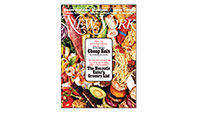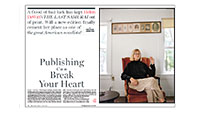 |
1. “The Omnivore’s Guilt Trip,” Nick Tabor and James D. Walsh’s comprehensive guide to the ethical, environmental, and health problems of virtually every food in the supermarket, left some readers more than a little disturbed (July 11–24). “Public service announcement,” tweeted @dtopping. “All food is bad.” “Okay,” wrote commenter moneyp, “within a few short months everyone should be thinning down significantly because we’ll barely be eating anything, having read the above. The trout piece made me never want to eat ever again.” But many felt that the guide — while upsetting — contained vitally important information. “This should be required reading for everyone,” wrote greeninla. “Even schoolchildren. Would it ever be possible for us consumers to not just be horrified by the food chain that feeds us, but to demand change within it? Pretty much all of these issues are the result of consumers wanting cheap food, while food suppliers try to meet the demands of an increasing world population. Either we begin to eat lower on the food chain and accept that we’ll pay more for cleaner/humane food, or these conditions will not only continue to exist, they’ll get worse. Demanding better conditions for the animals, eating fewer animals, and agitating our legislators to remove themselves from the back pockets of Big Ag and the chemical industry will help move the needle in the right direction. But entering into a state of grossed-out horror about what we eat and not doing anything about it seems lazy and futile.” KirRoyale agreed: “These concerns are usually derided as the purview of snobbish, self-obsessed yuppies, but I think that not caring how your food got to your plate is first-world arrogance and myopia at its worst. Whether you acknowledge that climate change is a contributor to political instability and terrorism or just want to be able to keep buying fish fifty years from now, the reality is that our food purchases matter on a global scale. NYMag — it’d be great if you could also make a list with information on specific vendors in NYC that take these concerns into account — butchers, fishmongers, etc.” Some readers thought the list was assaultive. “This is a stress sundae,” wrote commenter BrooklynBread. “Such an exhaustive list of ‘what’s wrong’ makes me feel like there’s little I can do to impact the industry,” agreed nayika83.
 |
2. “A flood of bad luck has kept Helen DeWitt’s The Last Samurai out of print,” reads the subhead of Christian Lorentzen’s profile of the author. “Will a new edition finally cement her place as one of the great American novelists?” (“Publishing Can Break Your Heart,” July 11–24). Readers enthusiastically hoped so. I’m “the most ready for DeWitt’s canonization,” tweeted @jenvaf. “This profile of Helen DeWitt is a puff piece, but there probably isn’t a writer alive who so deserves the puffing,” agreed @ Mr_Considerate. “My one encounter with DeWitt left me thinking for a long time about this overeducated, utterly brilliant nutcase,” wrote mollysgaga. “About a third of the way through The Last Samurai you realize that it is an experimental novel in the best possible way, where the structure and language are integral to the narrative rather than being used to bludgeon the reader. Thanks for writing about this masterpiece. I wish the MacArthur Award people would read The Last Samurai. There is no writer more deserving of the award.” Still, reader ottowood thought DeWitt’s plight — a second book that didn’t sell, a first that was widely acclaimed but long out of print — was par for the course. “Publishing is a business,” ottowood wrote. “They are not obligated to respect her genius.” And at least one reader was grateful that the story cleared up a long-held query. “I was never positive whether the Helen DeWitt book was related to the Tom Cruise movie,” tweeted @BigMean Internet. “But now I know they’re not. Thanks Christian Lorentzen.” Kellogg’s
3. “I didn’t realize that for certain older guys, the original Ghostbusters is the equivalent of a tree house that has the no girls allowed sign on it,” Paul Feig, director of the much-maligned women-led remake, told Jada Yuan (“Who Ya Gonna Troll,” July 11–24). “And I think they look at me as the guy who came up, took the sign, lit it on fire, and then painted the inside of the tree house pink.” “More power to you, Mr. Feig!” wrote commenter w.coll16. “Quality and content should be prioritized over representation but that doesn’t mean the two are mutually exclusive. Often diversity adds to the quality of the film.” “I’m so thankful for the way Paul brings women’s stories to the screen,” wrote @IsaAdney, adding: “#NoMovieJailForPaul.” HitFix’s Jill Pantozzi agreed that Feig’s work on Ghostbusters was massively important for female representation. “It was so refreshing [in Ghostbusters] that the obstacles in the way of the main characters didn’t revolve around their gender. Equally important, in my mind, was its depiction of female friendship and women working in stem fields … No matter how you feel about Ghostbusters, you can’t deny these women and their characters will make a lasting and powerful impact to so many people.” At least one reader, @douglas watters, thought if Paul Feig should be trolled, it shouldn’t be for casting female leads in his film. “Thrilled about the new Ghostbusters’ all-women cast,” he wrote. “But deeply troubled by its being made in Boston instead of New York. Ya’ll, THAT’s what we should be trolling Paul Feig about.”